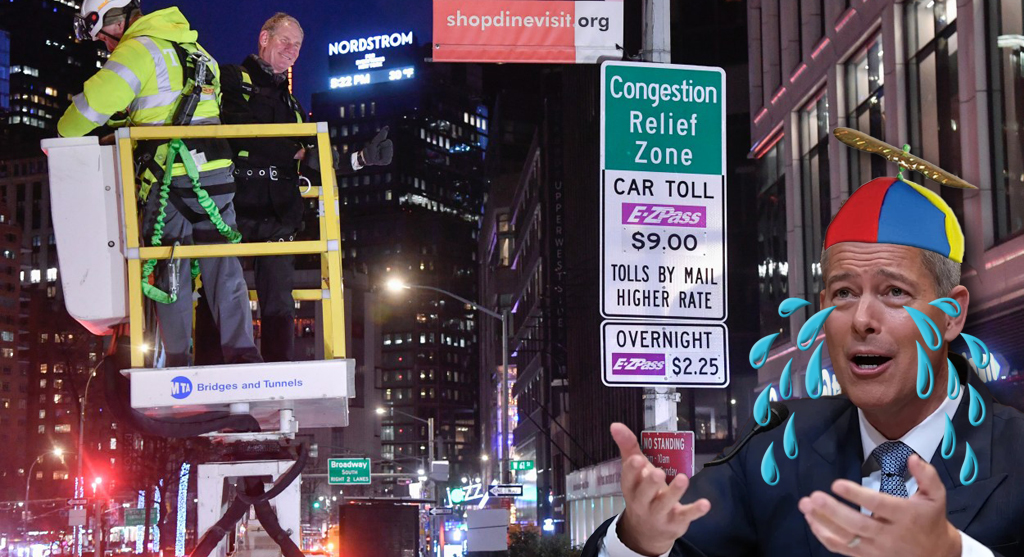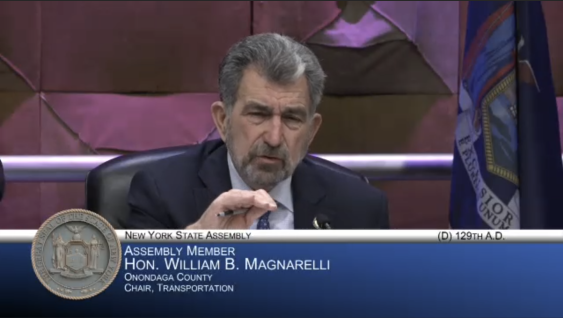Donald Trump says he's a king, but his Transportation Secretary is more like a child.
That's how one prominent Constitutional law expert described the U.S. DOT's closing argument for why Transportation Secretary Sean Duffy can kill congestion pricing: It is an argument that a child would make.
Duffy and the Federal Highway Administration are trying to nullify the agreement that authorized congestion pricing, in part, by claiming there is an unwritten rule allowing the federal agency to void a contract on a whim ... even if said contract has no language allowing for that to happen.
Obviously, the federal government regulates interstate travel, taxes and altering federal programs. But Duffy's lawyers are arguing that such federal power gives him "sovereign prerogatives [that] cannot be relinquished silently" — even though the Value Pricing Pilot Program contract that authorized congestion pricing in the first place does not have a clause letting the federal government cancel it.
In the MTA's view, that argument flows directly from "king" Trump's monarchal ambitions. And they mean "monarchy" literally:
"[A]ccording to defendants, ... the United States itself has the so-called 'sovereign power' to reneg[e] on any agreement that the federal government enters into with any party for any reason regardless of the express terms and governing regulations," lawyers for the agency wrote. "[But] our system of government is antithetical to the notion of a sovereign who has the power to terminate agreements on a pretextual whim the way that King Henry VIII of England terminate his wives (both literally and figuratively)."
The references to unrestrained sovereign power and kings connects with the radical right wing theories of an unrestrained unitary executive embraced by Trump and his Supreme Court crony John Roberts. It's a radical take on the rule of law, but it's also dumb and childish, said one Constitutional expert. Following that thinking to its logical conclusion, Trump and Duffy are suggesting that in the event of confusion over a law passed by Congress, Congress would want the president to decide when to break contracts.
"Duffy is citing a Supreme Court case called Winstar for the argument that when the law is ambiguous, you should assume Congress wants the president to break promises," said NYU law professor Roderick Hills, Jr. "'Congress wants us to behave like a king, Congress wants to give us a blank check to break our word.' Now, children can nullify their contracts. If a 9-year-old goes into a store and signs a contract to buy a refrigerator on the installment plan, obviously, that can be nullified because children are irresponsible and don't have competence to make binding contracts. So essentially, Sean Duffy has said, treat us like a child."
Plenty of people have already pointed out that Duffy has a childlike fear of the subway, so it tracks that Duffy would make an argument reducing his agency's trustworthiness to that of a kid. But Hills also said that the thought of Duffy in a rainbow propellor hat gets less funny when you think about what his argument means for actually running the government.
"If you act like a child, it means no one's going to make deals with you," he said. "For long-term capital projects, Congress wants the federal government's word to be its bond. If the federal government routinely broke contracts, no one would play ball with it. If you're a guardrail installer, and U.S. DOT comes to you and says, 'We'd like you to put in guardrails on highways,' you'd say, 'Great, I'll take a billion dollars up front. I don't trust you at your word, so I want it right now. That's my insurance policy in case the next administration says, "We changed our mind" before I finish the contract.' To avoid those excessive upfront charges, administrations and Congresses want to keep their promises. That's just good business."
For what it's worth, Liman himself wrote something similar to the analogy Hills gave, when he issued an injunction preventing the Duffy from retaliating against the MTA for refusing to turn the off the toll. Liman noted that the federal government can give itself the right to end an agreement if that right is included in a contract, but it's a recipe for chaos if the feds now want to say they can cancel an agreement once a project is running.
"The federal government can reserve to itself the right to terminate an award," Liman wrote in his May ruling. "[But] in the absence of any such reservation, the award recipient and those who invest their time and resources on the award grant are entitled to rely upon it and to presume that the award will be rescinded only if the award recipient or subrecipient fails to comply with the terms and conditions stated in the award. Few if any persons would buy bonds to support a capital project were the rule otherwise."
As such, Hills said that the case itself will most likely be decided soon — and in the MTA's favor. We'll always have Duffy as a child though.
"There's not a lot of suspense here, [Judge] Liman has already said what he believes. This is just going through the motions at this point to get to the Second Circuit. [The FHWA argument] is not practically very sensible, it doesn't make a heck of a lot of legal sense. They don't have any precedent to support it. So, I think this is one of the easier cases," he said.






